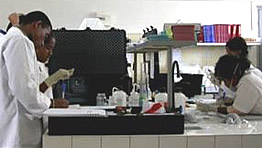To ensure the quality of antimalaria drugs available in the marketplace, PMI funds the United States Pharmacopeia’s Drug Quality and Information (DQI) program to work with the Ethiopian Drug Administration and Control Authority (DACA) and the Ministry of Health’s Malaria Control Program to train their staff on drug quality surveillance and to survey the types of antimalarial drugs in circulation in Oromia.
In most malaria-endemic countries, artemisinin-based combination therapy, a combination of two effective antimalarial drugs, is the first-line treatment for uncomplicated malaria. In Ethiopia, official policy discourages the use of artemisinin monotherapies and other drugs, such as sulfadoxine-pyrimethamine (SP), that are no longer effective against malaria. Such drugs can fail to treat malaria and increase the chance of malaria parasites developing drug resistance. However, a recent round of PMI-supported surveillance of antimalarials in Oromia Regional State found that the private market is rife with products that are not approved for the treatment of uncomplicated malaria, including artemisinin monotherapies and SP.
To ensure the quality of antimalaria drugs available in the marketplace, PMI funds the United States Pharmacopeia’s Drug Quality and Information (DQI) program to work with the Ethiopian Drug Administration and Control Authority (DACA) and the Ministry of Health’s Malaria Control Program to train their staff on drug quality surveillance and to survey the types of antimalarial drugs in circulation in Oromia.
In early 2009, trained government staff members collected samples of antimalarial drugs in the private market, tested their quality using a low-tech and cost-effective laboratory unit, and determined the drugs’ registration status. Test results revealed that many products were of questionable quality and the majority of the drugs were not registered by DACA. These findings highlight the importance of the drug registration processes, drug quality monitoring capacity, and DACA’s ability to take regulatory actions against people who sell sub-standard drugs.

